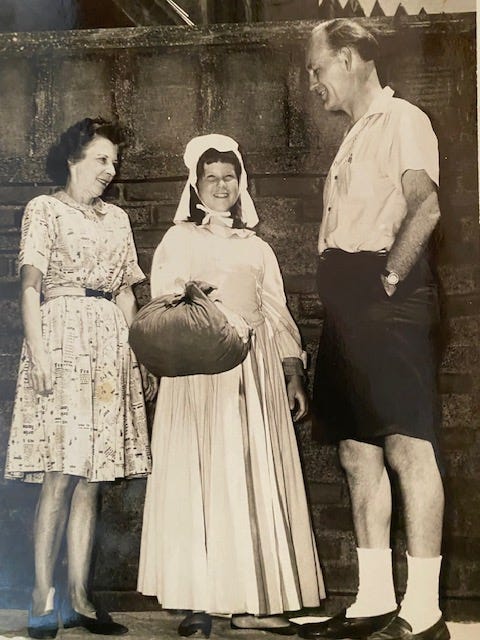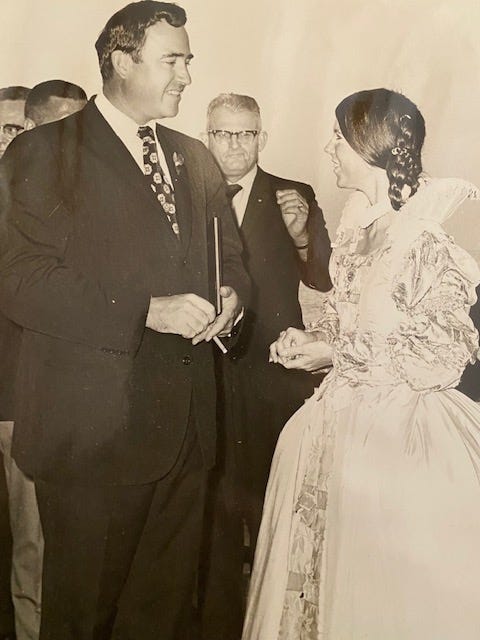Classically trained, Talmadge Ragan is a professional actor who has appeared on stage, screen, and television, and she does voice work for commercials, narrations, films, and radio theater. Her love of reading propelled her to add audiobooks to her repertoire. Talmadge's recordings include Margarita Nights by Phyllis Smallman, The Women's Rights Movement by Shane Mountjoy, and Afterage by Yvonne Navarro. Paul Green was a close family friend during her childhood. Ragan’s first appearance on stage after college was in Paul Green’s symphonic drama “The Lost Colony.”
By the time I was in second grade, I’d performed with the Raleigh Children’s Theatre. As a budding actress, I’d eagerly go to auditions as often as I could, including a couple for the role of Scout for the film version of Harper Lee’s novel To Kill a Mockingbird. In high school, I was as active as I could be in theater, serving as President of the Drama Club. I was very enthusiastic but not experienced enough.
I persevered.
My father, Sam Ragan— journalist, poet, and deeply dedicated arts advocate—had served for years on the board of the Roanoke Island Historical Association, which produced The Lost Colony. He was also appointed by the governor to serve as the first Secretary of the North Carolina Department of Cultural Resources and would become the state’s first Poet Laureate. As a family we’d travel to see The Lost Colony nearly every summer. I knew the play well and cherished every minute of it.

I grew up around writers and always felt comfortable sharing my thoughts with my parents’ writer friends who fueled my interest in so many things. Two very special people, the playwright Paul Green and his wife Elizabeth Lay Green, always welcomed my questions and encouraged my love of reading. I treasure the book I have of the 1954 version of The Lost Colony. It was published by The University of North Carolina Press and tells the Greens’ story of the play that is so deeply loved in North Carolina.
This “symphonic outdoor drama” as Paul Green called the theatrical genre he invented, opened July 4, 1937, and still runs every summer in Manteo on Roanoke Island. The show’s first year, during the depths of the Depression, it drew attention from across the nation. Federal funds were granted to hire actors, and the Civilian Conservation Corps built the Waterside Theatre right on the Sound. The Rockefeller Foundation donated an organ for the music. Green had been commissioned to dramatize the story of the first English settlers who arrived in North America 350 years before, and President Franklin Roosevelt and First Lady Eleanor Roosevelt attended the grand celebration. The U.S. Postal Service issued a commemorative stamp to mark the event.
By the time I was a teenager, auditions for Green’s first and best-known outdoor drama took place once a year in the spring in Chapel Hill. My mother knew my desire to be a part of the show. She was wonderfully supportive, and in 1969, she drove from Raleigh to pick me up in Virginia, where I was attending Chatham Hall, a girls’ boarding school, to take me to my audition—then back to Virginia to finish out the term. When I got a part, I was overjoyed.
Come June, after graduating from Chatham Hall, I was anxious to get to where I was going for the summer. My parents had come for my graduation, and as soon as we could leave on that beautiful afternoon, they would drive me down to Manteo on the coast of North Carolina where the annual rehearsals for Paul Green’s play The Lost Colony had just begun.
Rehearsals were already going on when we arrived. Because I was a week late, I tried to jump right in. If something was needed to be done in a scene, I’d volunteer to do it. Meanwhile, I’d try to get to know people and learn the ropes. I wanted to be accepted as part of the company.
Joe Layton, a Tony Award-winning American director and choreographer, known primarily for his work on Broadway, was our leader in 1969. A decade before, Layton had choreographed Once Upon a Mattress with Carol Burnett and The Sound of Music with Mary Martin on Broadway. Joe brought a lot of showmanship to Green’s play. Toward the end of the first act, he created a huge crowd scene which would start small and then grow bigger as more and more English people would filter into the scene, preparing to board the ship for the New World. It was panoramic and colorful, but also chaotic.
The audience had no idea about the quick changes backstage among the future colonists who were grabbing props and making their entrances. Actors carried bird cages. Children played and ran around. Vendors sold their wares, and buskers danced and sang. More and more people arrived to load the ship that would provide much needed supplies for the first band of settlers that had been stranded at their remote outpost as a war raged between Britain and Spain. At the end of Act One, the full cast was singing brightly as they climbed the ramp to the ship. The lights went up for what we fondly called “halftime” backstage, and after a quarter hour or so, everyone in the audience settled back into their seats as the cast landed on the actual site of the original Fort Raleigh where the theater had been built, where the play is set.
About half a mile from the theater, cast and crew shared two-bedroom apartments in Morrison Grove, a compound of sorts within walking distance of the Waterside Theatre, although some of the principal actors had their own places to stay in Manteo, not far from the theater. Late at night, when we’d come back from rehearsals or the show, the frogs serenaded us.
Three costumers and I occupied an upstairs apartment facing the Roanoke Sound. We could look out over the inland waterway, and it was very peaceful. I’d never been on my own like this before, much less shared an apartment with three people I didn’t know, though as it turned out, one of my roommates was actually an old friend from the Raleigh Cultural Center, where many of us had started performing in plays as students in Wiley Elementary School. There was one lone telephone booth in the center of the three apartment buildings, and a family in the show from Mississippi had a telephone. The parents were in the choir and their three daughters were colonists. We all worked and lived together agreeably, and to this day, I think most of us feel it was a family experience.
Before the season opened there was so much to do. There were dance warmups and classes, singing rehearsals, blocking rehearsals, and costume fittings. Some of us also waitressed at The Elizabethan Inn in Manteo. I usually worked the breakfast shift there. Others found temporary jobs over in Nags Head. Most of us didn’t have cars, so a ride with a friend was a plus when we needed to do laundry at the only laundromat in town. I was fortunate that one of my roommates had a car. We’d often see a couple of people walking on the road to Morrison Grove carrying huge bags of freshly washed clothes.
A few of us took dance classes with Mavis Ray, a choreographer and stage performer who also played the role of Dame Colman in the show. She was a tough cookie, very British, and well known for her work on Broadway. In classes and during warm-ups before the show, she’d march around the room and anyone she saw who wasn’t holding a position correctly would get a pop on the thigh with the stick she carried around. Bam! She was an excellent teacher.
Opening night came closer, and we all looked forward to what lay in front of us. Meanwhile, we also learned we’d be having more opportunities to do what we liked best—performing. There were several children’s plays that ran on weekends in the daytime and required actors. Some declined these opportunities, wanting only to concentrate on the show or preferring to spend their off hours at the beach.
Um Dilly by David Wood was one children’s play I remember. I was cast as the Dormouse in Alice in Wonderland. Several of us spent time working on an Elizabethan Masque, which we performed next door to the theatre in the Elizabethan Gardens. There was always something creative going on.
The season went by quickly. No matter how many times we performed the show—even those times we were ready for it to be over—we were never quite ready to say goodbye. All too soon we were packing up, saying goodbyes, and heading to our respective homes. We didn’t want the season to be over, and yet we knew we had to wrap up the summer and go on to whatever lay ahead: school for some, all kinds of jobs for others. “It’s something in the sea and air,” John Borden says to the colonists, and we, who’ve been involved in The Lost Colony over the years, understand and agree.
I remember one particularly wonderful night toward the end of that first season. We’d worked hard all week and spent an evening at William Ivey Long’s parents’ house in Manteo, sewing on some costumes that needed to be fitted and repaired. We were all exhausted except William, who said we had to stop for awhile.
“Let’s go outside,” he said.
We all stopped what we were doing and went outside. It was pitch dark.
“Look up,” he said, and we did. We felt very small looking at the deep night sky, appreciating a little break from what we had been doing. It was July 21st, the night the astronauts first walked on the moon, a night none of us there ever forgot. We, too, had been assuming the lives of adventurous explorers, and we would never lose the thrill of landing in a New World.





